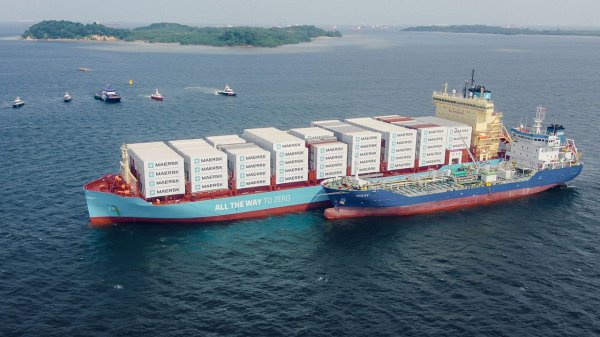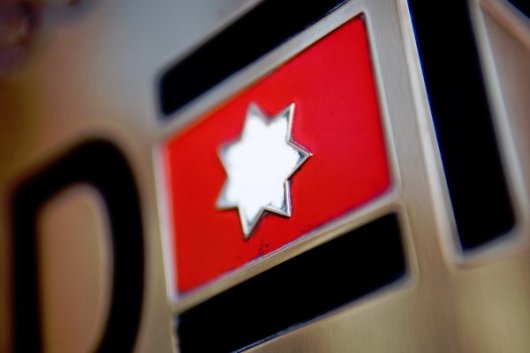Norden completes first biofuel test voyage
Shipper expecting 'high demand' for ships powered by second-generation biofuel.
D/S Norden says it has successfully completed a test voyage with a large commercial ocean-going vessel powered by biofuel.
The pilot, which was conducted during September in conjunction with Dutch supplier GoodFuels, was a ballast trip from Rotterdam to Tallinn on the 37,000-deadweight-tonne (dwt), 182-metre-long handysize product tanker Nord Highlander.
To compare how the engine reacted with biofuel as an alternative to low-sulphur fossil fuel, the departure from Antwerp was conducted on fossil fuel. Then, after a visual inspection of the engine, the vessel switched to biofuel.
During the voyage, the engine was operated at different loads for sufficiently long periods to establish stable performance. After the test, a final visual inspection of the engine was conducted, which, Norden notes, confirmed that the engine was not negatively affected by the biofuel.
The test voyage was the culmination of three years of extensive research and development with partners including Royal Dutch Boskalis and engine manufacturer Wartsila.
Rotterdam-based GoodFuels says its bio-fuel oil (BFO) delivers near-zero carbon and sulphur oxide emissions without any requirement for engine modifications.
"The successful operation effectively means that there is the capability to future-proof fuel requirements for shipowners and operators who are seeking an alternative to both distillates and Ultra Low Sulphur Fuel Oil (ULSFO) in order to comply with 2020 0.5% sulphur cap requirements, as well as impending International Maritime Organisation (IMO) Greenhouse Gas (GHG) reduction requirements," GoodFuels stated.
According to Norden, the test showed that second-generation biofuel is "a technically and economically suitable and thereby a realistic alternative to comparable fossil fuel" and that the engine's performance is not affected as "the full performance envelope can be delivered without restrictions".
Jan Rindbo, CEO of Norden, remarked: "Norden is proud to be at the forefront of testing and introducing ... fuel that truly makes an impact on the highly important agenda of reducing the carbon footprint of shipping."
Describing the company's work on improving fuel efficiency and lowering emissions, Rindbo noted: "Norden has come a long way in increasing fuel efficiency and has reduced CO2 emissions per tonne cargo transported on owned tanker vessels by 25% between 2007 to 2017. With the newly introduced IMO targets on CO2 reductions, however, it is evident that increased fuel efficiency alone is not enough. We need alternative solutions and with this test, Norden has shown a viable method towards reaching these targets."
Norden acknowledges that biofuel may not be the only solution in the long run; however, the Danish shipper believes that second-generation biofuels available now can contribute significantly to reducing CO2 emissions in the present day and will be in "high demand".
"I am convinced many carbon conscious customers within a foreseeable future will demand this type of transport," he commented.
As previously reported, studies carried out by UMAS in conjunction with Lloyd's Register - one published in May and another last December - concluded that biofuel is currently the most affordable zero-emission option for shipping.
Last year, another study performed in Norway by the Industrial Ecology Programme and Department of Energy and Process Engineering at the Norwegian University of Science and Technology (NTNU) and SINTEF Ocean identified biofuel as having the highest CO2 emissions reduction potential in comparison with a list of other measures.
The pilot, which was conducted during September in conjunction with Dutch supplier GoodFuels, was a ballast trip from Rotterdam to Tallinn on the 37,000-deadweight-tonne (dwt), 182-metre-long handysize product tanker Nord Highlander.
To compare how the engine reacted with biofuel as an alternative to low-sulphur fossil fuel, the departure from Antwerp was conducted on fossil fuel. Then, after a visual inspection of the engine, the vessel switched to biofuel.
During the voyage, the engine was operated at different loads for sufficiently long periods to establish stable performance. After the test, a final visual inspection of the engine was conducted, which, Norden notes, confirmed that the engine was not negatively affected by the biofuel.
The test voyage was the culmination of three years of extensive research and development with partners including Royal Dutch Boskalis and engine manufacturer Wartsila.
Rotterdam-based GoodFuels says its bio-fuel oil (BFO) delivers near-zero carbon and sulphur oxide emissions without any requirement for engine modifications.
"The successful operation effectively means that there is the capability to future-proof fuel requirements for shipowners and operators who are seeking an alternative to both distillates and Ultra Low Sulphur Fuel Oil (ULSFO) in order to comply with 2020 0.5% sulphur cap requirements, as well as impending International Maritime Organisation (IMO) Greenhouse Gas (GHG) reduction requirements," GoodFuels stated.
According to Norden, the test showed that second-generation biofuel is "a technically and economically suitable and thereby a realistic alternative to comparable fossil fuel" and that the engine's performance is not affected as "the full performance envelope can be delivered without restrictions".
Jan Rindbo, CEO of Norden, remarked: "Norden is proud to be at the forefront of testing and introducing ... fuel that truly makes an impact on the highly important agenda of reducing the carbon footprint of shipping."
Describing the company's work on improving fuel efficiency and lowering emissions, Rindbo noted: "Norden has come a long way in increasing fuel efficiency and has reduced CO2 emissions per tonne cargo transported on owned tanker vessels by 25% between 2007 to 2017. With the newly introduced IMO targets on CO2 reductions, however, it is evident that increased fuel efficiency alone is not enough. We need alternative solutions and with this test, Norden has shown a viable method towards reaching these targets."
Norden acknowledges that biofuel may not be the only solution in the long run; however, the Danish shipper believes that second-generation biofuels available now can contribute significantly to reducing CO2 emissions in the present day and will be in "high demand".
"I am convinced many carbon conscious customers within a foreseeable future will demand this type of transport," he commented.
As previously reported, studies carried out by UMAS in conjunction with Lloyd's Register - one published in May and another last December - concluded that biofuel is currently the most affordable zero-emission option for shipping.
Last year, another study performed in Norway by the Industrial Ecology Programme and Department of Energy and Process Engineering at the Norwegian University of Science and Technology (NTNU) and SINTEF Ocean identified biofuel as having the highest CO2 emissions reduction potential in comparison with a list of other measures.

|
VARO Energy expands renewable portfolio with Preem acquisition
All-cash transaction expected to complete in the latter half of 2025. |
|
|
|
||

|
NYK trials biofuel in milestone coal carrier test
Vessel is used to test biofuel for domestic utility company. |
|
|
|
||

|
H-Line Shipping orders LNG bunkering vessel
Vessel with 18,000-cbm capacity to run on both LNG and MDO. |
|
|
|
||

|
How to engineer and manage green shipping fuels | Stanley George, VPS
Effective management strategies and insights for evolving fuel use. |
|
|
|
||

|
Swedish government bans scrubber wastewater discharges
Discharges from open-loop scrubbers to be prohibited in Swedish waters from July 2025. |
|
|
|
||

|
MAN Energy Solutions achieves 100% load milestone for ammonia engine
Latest tests validate fuel injection system throughout the entire load curve. |
|
|
|
||

|
Petrobras secures ISCC EU RED certification for B24 biofuel blend at Rio Grande
Blend consisting of 24% FAME is said to have been rigorously tested to meet international standards. |
|
|
|
||

|
Stolt-Nielsen to fully control Avenir LNG with acquisition
Share purchase agreement to buy all shares from Golar LNG and Aequitas. |
|
|
|
||

|
Bureau Veritas supports launch of CIMC SOE's LNG bunkering vessel
Handover of Seaspan Energy's cutting-edge 7,600-cbm vessel completed. |
|
|
|
||

|
Methanol as a marine fuel | Steve Bee, VPS
How environmental legislation has driven the development of low-sulphur fuels and methanol-ready ships. |
|
|
|
||
Related Links
- · Biofuel comes out on top in another Lloyd's Register-UMAS report [Insights]
- · UMAS blasts LNG project spending as 'high-level failure in EU planning' [Insights]
- · New report ranks biofuel as best zero-emission solution [Insights]
- · Study warns against 'one-sided focus on LNG' as biofuel tops CO2 reduction chart [Insights]

